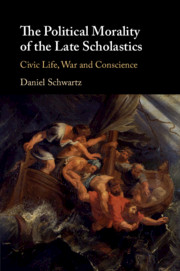Book contents
- The Political Morality of the Late Scholastics
- The Political Morality of the Late Scholastics
- Copyright page
- Dedication
- Contents
- Acknowledgements
- Abbreviations
- Introduction
- Part I Civic Life
- Chapter 1 The Ethics of Electoral Bribing
- Chapter 2 The Ethics of Tax Evasion
- Chapter 3 Keeping Out the Foreign Poor: The City as a Private Person
- Chapter 4 The Political Duty to Keep Your Secrets
- Chapter 5 Scandal and Inexcusable Portraits
- Part II War
- Bibliography
- Index
Chapter 1 - The Ethics of Electoral Bribing
from Part I - Civic Life
Published online by Cambridge University Press: 09 February 2019
- The Political Morality of the Late Scholastics
- The Political Morality of the Late Scholastics
- Copyright page
- Dedication
- Contents
- Acknowledgements
- Abbreviations
- Introduction
- Part I Civic Life
- Chapter 1 The Ethics of Electoral Bribing
- Chapter 2 The Ethics of Tax Evasion
- Chapter 3 Keeping Out the Foreign Poor: The City as a Private Person
- Chapter 4 The Political Duty to Keep Your Secrets
- Chapter 5 Scandal and Inexcusable Portraits
- Part II War
- Bibliography
- Index
Summary
- Type
- Chapter
- Information
- The Political Morality of the Late ScholasticsCivic Life, War and Conscience, pp. 15 - 32Publisher: Cambridge University PressPrint publication year: 2019

